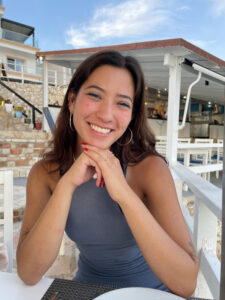Getting involved with academic publishing is not all that common for a bachelor’s student. So when Laetitia Guérin, a double major in nanobiology and philosophy, got the unique opportunity to work as a student editor for the open access Journal of Human-Technology Relations (JHTR) she jumped right in. Over the last year, the experience has taught her about the ins and outs in the world of publishing and provided insights that are guiding her as she looks to her own future.
Double degree

After starting a bachelor’s in nanobiology at TU Delft, Guérin felt the need to expand her academic pursuits and decided to take on a second bachelor’s degree in philosophy at Erasmus University in Rotterdam. Balancing such distinct subjects and a double degree is no small feat, but Guérin sees each as essential to her academic journey. “I pour my heart into whatever I do, even though it is a lot of work,” she says.
During her minor in AI, Guérin became fascinated with machine learning, particularly its applications in science and ethics. Now in her fifth year, she’s working on her nanobiology thesis project to create a machine learning algorithm to predict redox potential for the protein family known as ferredoxins. “Knowing the redox potential for proteins is very useful in many biotechnical applications, but calculating it computationally is very costly, and in the lab, it’s very laborious,” she says. “So machine learning is the perfect compromise.” Guérin also recently started writing her philosophy thesis on how the rise of technology, specifically AI, makes us rethink the human condition – what it means to be human and where we find purpose and meaning in our lives.
Opportunity knocks

During her minor, an ethics of AI course resonated deeply with Guérin. The teacher, Assistant Professor Olya Kudina, co-founded the Journal of Human-Technology Relations (JHTR), an open-access journal launched at TU Delft. Kudina was looking for assistance with copy-editing, and Guérin saw an opportunity to contribute to a publication that aligned with her academic interests.
Originally hired as a copy editor in October 2023, she quickly found herself expanding her role. “There was a big learning curve at first, and then one of the head editors resigned, and I had to take on some extra tasks,” she explains. Guérin slowly became more involved in the actual production and publishing steps of the articles. Her new responsibilities included communicating with associate editors and authors, coordinating submissions, creating metadata, and generating digital object identifiers (DOIs). The experience was like a crash course in the world of academic publishing, learning the meticulous, multi-step processes that bring scholarly articles to life.
Open access advantage
Working with JHTR, an open-access journal, has only strengthened Guérin’s belief in the accessibility of academic knowledge. As a student, she’s familiar with the frustrations of paywalled articles that prevent the public from accessing important research. “I hate when I find a really interesting paper online, and then I have to pay for it,” she says. “Having an open-access journal lets you reach a wider audience,” she adds, noting how the ease of access benefits not only the readers but also the authors, who can share their work with a broader community.
Knowledge for the future
Guérin’s hands-on experience at JHTR has been invaluable. “I knew nothing about publishing before I joined the journal,” she admits. Now, she not only understands the intricate processes involved—from copy-editing and reviewing to final publication—but she’s also learned how to navigate the ‘politics of publishing’, gaining insights into editorial decision-making, journal identity, and the nuances of the peer review process. Reading each paper in depth during copy-editing has been particularly enlightening, as she sees that even published papers are rarely perfect. This new perspective has reassured her as a student and a future researcher; errors and revisions are part of the process, and getting a paper accepted doesn’t require perfection. Guérin also pointed out that the JHTR encourages paper submissions from students, which is rare in academic journals.
Through her work, Guérin also found an inspiring community of academics who share her passion for philosophy and technology. Her interactions with associate editors and colleagues from diverse backgrounds have reinforced her desire to stay connected to these fields. “It reignited this passion that I have for philosophy and art, and made me realise I want to stay close to that in the future,” she says. This experience has even influenced her academic plans, as she is considering a double master’s degree, allowing her to continue her exploration of both science and philosophy.
Reflections
Reflecting on her role at JHTR, Guérin recommends editorial work for other students who might have the opportunity. “If they’re detail-oriented, I’d say that’s probably the most important thing.” Copy-editing can be meticulous, but it’s an ideal way for students to learn the ins and outs of academic publishing. She’s especially grateful for the opportunities she’s had to work with a supportive team and gain exposure to the publishing field. “The team at the TU Delft Library is very active, and they are extremely receptive to my feedback,” she explains, appreciating the autonomy and trust her supervisors have given her.
Growing up in an engineering-focused community, she often felt as though her interest in the social sciences would remain secondary to her scientific pursuits. But her experience at JHTR has shown her the potential for a fulfilling career that combines both: “I’ve seen it is an exciting life, and it might just be one I want to lead as well.”
